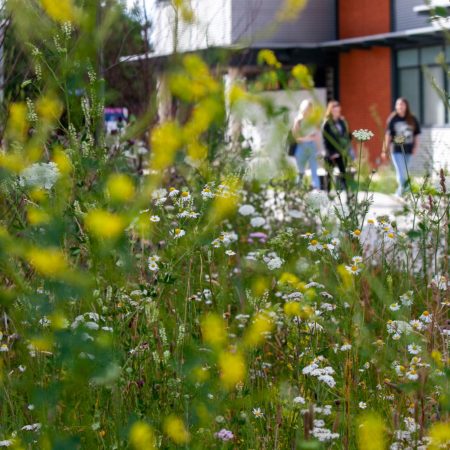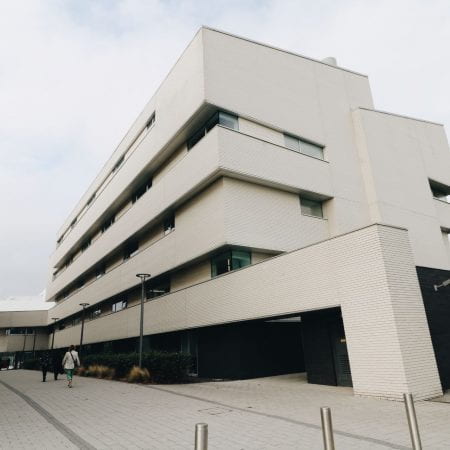The University operates an EEMS (Energy and Environmental Management System) that is certified to ISO14001. The formal scope of our EEMS is:
‘The management of environmental, energy and sustainability aspects concerning all university activities which take place in buildings or on land owned, or leased, and operated by the University of Lincoln.’
Staff can request our EEMS documentation by contacting us by email at environment@lincoln.ac.uk. The structure of our EEMS is available here. We are also happy to speak to student groups and at departmental meetings.
Our EEMS is externally audited annually, with internal audits conducted throughout the year.
“The EEMS provides a structured approach for managing the University’s impacts on the environment. Objectives and targets are set each year, to minimise the impacts of the University estate on the environment. It enables us to identify opportunities to have a positive impact too, for example, through enabling sustainable travel, embedding sustainability in the curriculum, and improving biodiversity.”
Key aspects to manage and monitor
The University has identified the following key energy/environmental aspects that require managing and monitoring, click below for further information about each area and who is responsible for the aspect.
Energy, carbon and emissions to air
The University is committed to cutting carbon emissions by 60% by 2030 as part of the driver to create a carbon neutral institution within a generation, and achieve Net Zero by 2040. Carbon Management Plan. The University of Lincoln is certified to the international ISO 50001 standard for its energy management system; this helped to drive best practice throughout the organisations and will continue to improve the University energy performance.
Part of this commitment includes reviewing energy use within each building, there is an effective BMS system in place allowing the BMS Manager to control systems, additionally energy driven equipment (such as fume cupboards, computers and fridges) are assed for use and energy consumption to then dictate best practise.
Additionally, the University actively manages the impact of potential emissions to air by ensuring the proper maintenance and inspection of equipment such as fume cupboards and refrigerants. Additionally, procedures are in place to provide opportunities for EV charging and to encourage the purchase of university owned electric vehicles.
Aspect Owner(s):
Head of Maintenance
Energy Manager
BMS Engineer
Transport on campus
The University aims to review what fleet, farm and hire vehicles are utilised for business and commuting, as well as ensuring that they are fit for purpose. It is imperative that personnel are trained to deal with potential spills from these vehicles and know how to dispose of oil/chemicals correctly. Efforts should also be made to reduce emissions to air both through university managed vehicles as well offering opportunities for staff to reduce their scope 3 emissions. Additionally, procedures are in place to provide opportunities for EV charging and to encourage the purchase of university owned electric vehicles.
Farm vehicles must be washed down in an area with an inceptor.
Aspect owner(s):
Facilities Manager
Farm & Estate Manager
Energy Manager
Management of hazardous substances
It has been identified that oils and chemicals must be correctly managed and stored to prevent land/water contamination. Whilst individual schools are responsible for the storage, treatment and disposal of chemicals, the control procedures are audited as part the Environmental Management System. The Sustainability Team will offer spill training to identified staff.
Aspect owner(s):
Head of Maintenance
Head of Sustainability
Water use
The University of Lincoln is a major water user, consuming around 178,000 litres / day during term time – that’s 14.5 litres for every student and member of staff (full-time equivalent). The review of water usage is two-fold.
The Soft FM Contractors actively work to reduce the use of water when cleaning, whilst the Energy Manager implements Trade Effluent provisions for the discharge of waste liquids.
Aspect owner(s):
Head of Sustainability
Energy Manager
Construction
The environmental and sustainability impacts of new buildings and major refurbishment projects are an important consideration for the University of Lincoln.
The University Sustainable Design Guidelines can be found on the Estates Policies page: Policies
New build construction projects and major refurbishment projects should fulfil the following requirements:
- Increasing energy efficiency and reducing carbon emissions
- Ensuring comfort and experience of building users
- Considering and meeting site-specific requirements, such as land contamination, flood risk alleviation and planning restrictions
- Providing adequate metering facilities and BMS controls to ensure effective utilities management and energy data analysis
- Minimising water consumption
- Minimising impact on biodiversity and provide new habitats for nature and wildlife to thrive, offsetting any losses incurred
- Facilitating and supporting sustainable travel
- Taking a Whole Life Cycle approach to project costing and design
- Designing a waste management strategy that enables effective segregation, management and collection of waste
- Delivering seasonal commissioning process, using ‘soft landings’
Aspect Owner(s)
Head of Projects
Space Manager
Waste management
As required by the waste hierarchy and in accordance with a life cycle approach, efforts will be made to reduce or minimise the amount of waste produced. By considering the end of life at the procurement stage, products can be bought to last, rather than for a short period of use before disposal.
Where waste avoidance is not possible, all staff must ensure that the waste they produce is appropriately segregated to allow for re-use or recycling. Waste that can be recycled at the University, via the dry mixed recycling streams, are:
- Clear plastic
- Aluminium
- Paper
- Cardboard
Read more about waste on campus
Additionally, the University will:
– Ensure clear processes for waste management are in place and adhered to by all areas of the University, including ensuring copies of all waste consignment notes are received following collections
– Conduct periodic waste audits to monitor extent of recyclables entering the general waste stream
– Develop and run a waste awareness campaign
– Support colleges to develop and follow central process for disposing of hazardous waste
– Agree central procedure for WEEE waste disposal and highlight locations of WEEE storage facilities
Aspect Owner(s)
Head of Sustainability
Facilities Manager
Technical Manager
Biodiversity on campus
The University has a commitment to manage and protect the biodiversity assets on our estate. The University’s Environmental Policy includes a commitment to monitor the biodiversity value of the estate and since 2012 we have had a specific Biodiversity Policy. Read our policies: Policies Webpage
Areas that must be monitored include:
- Spills/leaks of oils/chemical equipment
- Use of fertilisers
- Use of pesticides/herbicides
- Grounds maintenance activities
- Provision of natural habitats
- Planting of new plants/trees
- Reservoir management
Aspect Owner(s)
Farm & Estate Manager
Head of Sustainability
Procurement
Environmental and energy efficiency considerations with respect to the procurement of goods and services are determined and considered as required by the Procurement team.
Full guidance is provided here, for the University Sustainable Purchasing Principles .
For tenders above the value of £100,000, the Procurement Team are involved in the tender process and have a set of pre-defined Sustainability-related questions that should be considered by the contract owner, with subject matter advice available from the environment team. Contract Review meetings provide a forum to review environmental performance.
The Environment and Energy Policy is publicly available to all suppliers tendering for work from the University.
Aspect Owner(s):
Head of Procurement & Insurance
Education for Sustainable Development
The University is developing a new programme for Education for Sustainable Development (ESD), this is included within the Environmental Sustainability Strategy(opens in a new tab).
The University is actively encouraging our Academic Staff to include sustainability elements into their courses and the Sustainability Team is available to support these initiatives. Academic staff are invited to contact Rebecca Mills, Sustainability Manager, if they are interested in having one of the team deliver a lecture, seminar or workshop for students.
Staff and Students can undertake a number of different courses delivered through the University, including:
- Carbon Literacy Training
- Introduction to Sustainability at the University
- Waste Management, and
- Workshops delivered during the Climate Action Festival Week
Read more about Education for Sustainable Development at the University
Aspect Owner(s)
Head of Sustainability



